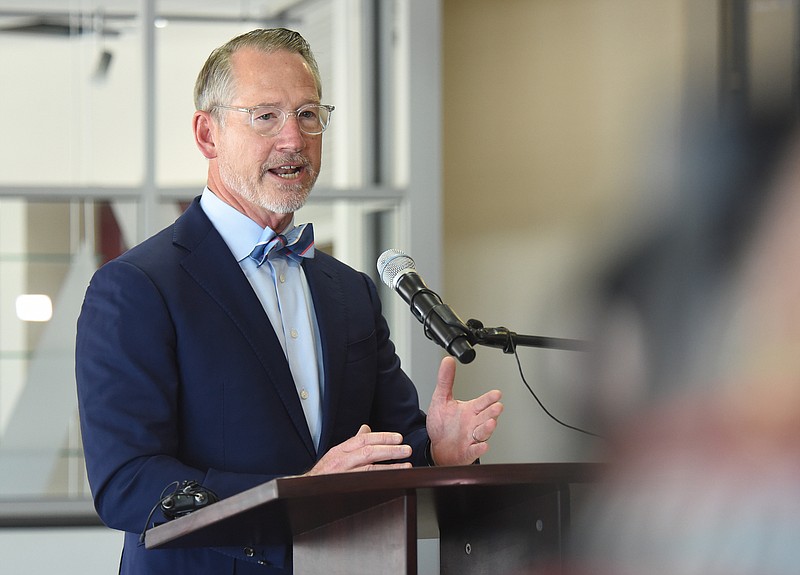The word "annexation" in a new bill filed in the Tennessee General Assembly has spooked people afraid the state may be seeking to return to the day when municipalities could gobble up unincorporated territory at will.
However, the bill is doing nothing of the sort, state Sen. Bo Watson, R-Hixson, said. He along with the late state Rep. Mike Carter shepherded the 2014 bill that stopped forced annexation, and he has sponsored the current bill.
The bill, as introduced, "deletes [the] requirement that municipalities adopt a comprehensive growth plan and have an approved urban growth boundary prior to annexing unincorporated territory."
The bill's intent, Watson said, is to eliminate the bureaucracy attached to comprehensive growth plans, which were created for local governments to delineate defined boundaries for potential annexation or incorporation over the coming 20 years. The committees that create the plans and update them every few years are required to include representatives of each of the cities and the county mayor, or executive, plus representatives of the soil conservation district, utilities, school systems, chambers of commerce, and others representing environmental, construction, and homeowner interests.
The committees then submit the plans to their county commissions and municipal governing bodies and must include certain planning studies and land use projections about the type of comprehensive growth plan that is desired.
The question is since annexation by ordinance is no longer possible, Watson said during an interview with this page, "do we need all these pre-determined boundaries? Do we need all of these growth plans?"
Several groups such Friends of Hamilton and Patriots Engage have suggested the bill is a back-door path to annexation, allowing municipalities no longer bound by a growth plan to annex territory not necessarily contiguous to their border.
"FOH has a history on the hard-fought right to restore private property rights to the Citizens of Tennessee," a post on the Friends of Hamilton Facebook page states, "for the right to vote on annexation and protect their private property rights [from] corrupt cities like Chattanooga telling citizens they will ticket them for going to church during covid. Citizens want less government!"
In a posted response denying the bill has any nefarious intent, Watson said, "Absolutely not! We are considering whether the growth boundary statutes are necessary now that forced annexation has been eliminated by myself and Rep Carter. Rep Carter and I frequently discussed repealing Chapter 1101 [which provides the development of growth plans] or modifying it. I'm continuing that work. Next step is deannexation which Rep Carter and I also worked on together. Let me be clear -- there is absolutely no intent to repeal the work Rep Carter and I did on annexation."
Some hearing about new bill may have thought annexation as an entity was eliminated by Watson's and Carter's bill, but annexation remains a viable way for municipalities to grow. The difference now is that those annexation plans must have permission of the people being annexed or must be affirmed by a majority of votes in a referendum.
The new bill, Watson said, "doesn't change how the process of annexation occurs."
With the intent of his bill and no more comprehensive growth plans in place, Chattanooga and Soddy-Daisy, for example, could compete for unincorporated territory, he said. And he said the territory would have to be contiguous to the municipality. But whichever municipality plans to annex the territory still would have to have permission of the people they seek to annex.
Watson said if there is something he and House sponsor William Lamberth have missed, and there is some glitch in the law that would change the intent of what they want it to do, "we are not going to do it."
"That's how legislation works," he said. "We can't talk about it if we don't introduce it. The intent of Rep. Carter and I is that annexation should be a challenging process -- not by ordinance."
Friends of Hamilton spokesman Chris Matthews, in an article on the Tennessee Conservative website, said deannexation rather than any potential return to forced annexation should be on the minds of legislators.
"There should be a vehicle for deannexation," he said. "Cordova successfully deannexed from Memphis. Bills were introduced in the past, but never made it into law."
Watson said that will have to come separately. He said such plans had been part of annexation bills in the mid 2010s, but "we couldn't get it all done. We had to pull it out."
As for now, he said, "[deannexation is] a completely different conversation."
We believe the Hixson state senator when he says he has no designs on reversing the annexation bill he and Carter worked on so tirelessly and so long, and we also believe he would be the first to pull his new bill if he thought there was any danger of any back-door annexation occurring. Still, his bill is certain to have more than a few eyes on it.
